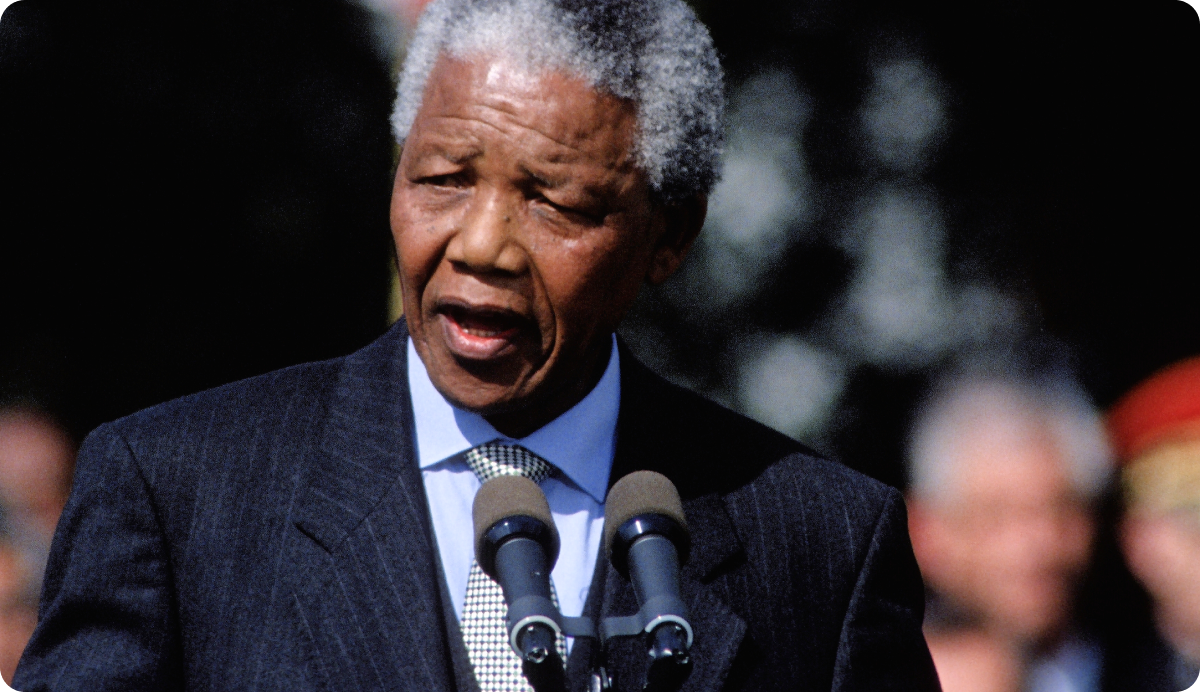Throughout history, the human voice has always been a powerful weapon for change.
Many great leaders, great orators, and people with vision have given speeches that made their way into the history books. But at the end of the day, every great speech is just words and ideas, right?
Or is it . . .
A lot of speeches can inspire people to do better and be better, but then there are the speeches that inspire entire nations to make history. Bolstering the resolve of even a small group of listeners can bring about world-altering changes.
So we set out to track down some of those special speeches. Every speech on this list led to direct and lasting changes throughout the world, and even to this day, many lines of these speeches might just sound familiar to you.
Download a copy of all 7 speeches.
Queen Elizabeth I—Speech to the Troops at Tilbury
In the 1500s, Spain was considered the most powerful country in the world. When the English became their rivals on the trade routes to the New World, King Phillip II responded by building the Spanish Armada, a fleet of 122 ships.
When the armada launched to invade Britain, the English were sorely outnumbered in both troops and ships. But one thing they had that Spain didn’t was Queen Elizabeth I.
As the Spanish Armada was sailing up the English Channel in 1588, the English land troops gathered at Tilbury, Essex. The queen made a public appearance to boost morale and delivered her iconic Tilbury speech. She was famously wearing a white velvet dress and a breastplate, presenting herself not as a queen but as a war leader of mythological proportions.
To put it lightly, her speech landed. After a nine-day battle, the Spaniards suffered a humiliating defeat and Britain was secured as a world power. Historians are still unclear whether the victory happened thanks to superior war tactics or just a series of very lucky breaks, but there’s no doubt that the English troops’ faith in their queen allowed them to secure victory against incredible odds.
Patrick Henry—Speech at the Second Virginia Convention
Patrick Henry was both a great orator and a Virginian statesman of colonial America. When George III passed the Stamp Act and the Townshend Acts, imposing unreasonable taxes on the colonists, Henry was one of the first voices to demand liberty of the American people.
War was brewing, but the vast majority of the colonists weren’t sure if it was worth it to engage in the conflict. What chance did they have against the British? While Massachusetts was preparing for war, Virginia was still on the fence. A delegation of Virginian patriots came together at the Second Virginia Convention to vote on how to proceed in the coming conflict.
This convention became the backdrop for Patrick Henry’s famous speech “Give Me Liberty or Give Me Death,” in which he radically proposed that Virginia organize a militia and prepare for war. Thanks to Henry’s speech, his resolutions narrowly passed the assembly, and Virginia joined the Revolutionary War.
This was a huge step toward American independence. Beyond that, young Thomas Jefferson and George Washington were both in attendance to hear Patrick Henry’s speech. These men went on to play key roles in the formation of America and to become U.S. presidents.
Mahatma Gandhi—Quit India Speeches
In history, Mahatma Gandhi is widely recognized as a non-violent revolutionary and a seeker of truth.
Perhaps one of Gandhi’s greatest victories is also linked to one of his greatest addresses ever given. In 1942 virtually the entire world was embroiled in conflicts, and India was no exception. The country had lived under British rule for over a century, and the Indian people were tired of the economic disadvantages and high taxation of the arrangement.
This unrest escalated when Great Britain joined World War II and began dragging India into the conflict as well. In August of 1942, Gandhi delivered his famous “Quit India” speeches, entreating the British to grant the Indian population immediate independence. This speech also called the Indian populace to passive resistance against their British rulers.
The same day of Gandhi’s speech, the All India Congress Committee (AICC) passed the Quit India Resolution. The road ahead was long and filled with political turmoil, but eventually in the summer of 1947, India was declared an independent country at last.
Eleanor Roosevelt—Address to the United Nations on the Universal Declaration of Human Rights
Married to President Franklin D. Roosevelt, Eleanor Roosevelt was America’s first lady for twelve years. Most historical sources describe her as shy and retiring, but she was a dedicated politician, humanitarian, and activist for the better part of her life.
After President Roosevelt’s death, President Harry S. Truman appointed Ms. Roosevelt to be the U.S. delegate to the United Nations (UN). In this role she accomplished her life’s greatest work by drafting and presenting the Universal Declaration of Human Rights.
Inspired by the atrocities of World War II, the declaration’s purpose was to define universal human liberties and ensure that the tragedies of WWII would never happen again. Ms. Roosevelt worked tirelessly for nearly two years to create a draft and resolve numerous stalemates amongst her fellow delegates.
On December 9, 1948, Ms. Roosevelt attended the United Nations General Assembly in Paris to deliver an impassioned speech, urging the assembly to adopt the finished declaration. At 3:00 am the very next day, the UN unanimously accepted the document.
The Universal Declaration of Human Rights has since influenced national constitutions and human rights agreements all around the world. The Guinness Book of World Records recognizes it as the most translated document in the world—translated into 370 languages and dialects.
Martin Luther King Jr.—“I Have a Dream”
If you’ve heard of any speech on this list, it’s probably this one. Martin Luther King Jr.’s “I Have a Dream” speech is considered one of the greatest speeches in American history and was indeed a battering ram for change.
A Baptist minister and staunch social activist, King was the face of the American civil rights movement during the 1950s and 60s. During this era, just about every part of American life was segregated by skin color: buses, restaurants, schools, even restrooms and water fountains.
King used his oratory talents as a pastor to deliver rousing speeches to his followers and the nation on the importance of equality. He was also involved in many famous protests, including the 1963 March on Washington.
That march culminated in a gathering at the Lincoln Memorial where King delivered his “I Have a Dream” speech to a crowd of 250,000 people. Key sections of the speech hearkened back to Abraham Lincoln’s famous Gettysburg Address, and it’s believed that the final section of King’s speech was actually improvised.
This speech was a manifesto for the American civil rights movement and truly became the rallying cry for supporters of equality. By the mid 1960s, both the Civil Rights Act and the Voting Rights Act were passed in Congress thanks in large part to King’s words and his influence.
Nelson Mandela—Speech at the Rivonia Trial
In 1948, South African leadership began enforcing official policies of racial segregation. This apartheid segregation restricted who black Africans could marry, where they could live, and what professions they could work.
As the leader of the African National Congress (ANC), Nelson Mandela and his comrades spent years fighting against apartheid. He was arrested several times for treason and sabotage, and when the government raided an ANC hideout in Rivonia, they finally had enough evidence to charge 11 ANC leaders—including Mandela—to life imprisonment.
At the Rivonia Trial in 1964, Mandela stood before the South African Supreme Court. Instead of testifying for himself, he delivered the speech that even today defines him as a leader. In it he expressed his passion for the freedoms of the African people and his hatred for apartheid. The address held the court spellbound for nearly four hours.
Although his words did not save Mandela from being convicted, the speech struck a chord in the hearts of his audience and stirred up unrest in the South African people.
Mandela served 27 years in prison for his beliefs, but his words and his bravery were instrumental in dismantling the apartheid system in his country. He was eventually released from prison in 1990, won the Nobel Peace Prize in 1993, and became the country’s first black head of state and the first to be elected democratically.
Ronald Reagan—Remarks at the Brandenburg Gate
After World War II, the Berlin Wall divided eastern and western Germany into two separate nations: one that was free and one that wasn’t. In his address at the Brandenburg Gate, President Ronald Reagan challenged Soviet leader Mikhail Gorbachev to finally put an end to the divide and unite Berlin once again.
This address was delivered during the height of the Cold War, and even the president’s own advisors feared that his remarks were crossing a line. Reagan gave the speech anyway.
There’s still a fair amount of debate on just how much influence Reagan’s words had in ending the Cold War, but there’s no doubt that his bold declaration, made right next to the most visible symbol of the Iron Curtain, certainly made an impression.
The very next year, Gorbachev himself gave his famous “Freedom of Choice” speech to the UN General Assembly, marking the beginning of the Cold War’s thaw. On November 9, 1989, the head of the East German Communist Party announced that his citizens were free to cross the border. Crowds showed up with picks and hammers to knock down the edifice, and after 28 years the Berlin Wall finally fell.
How Video Helps Speakers
Video is a powerful tool for developing speech presentation skills. Video helps speakers self-reflect and become aware of their skills as presenters. Video captures the authentic experience of the speech, providing an irrefutable and easily reviewable recording of the speech for evaluation. Discover how GoReact delivers video + feedback for any skill development.






